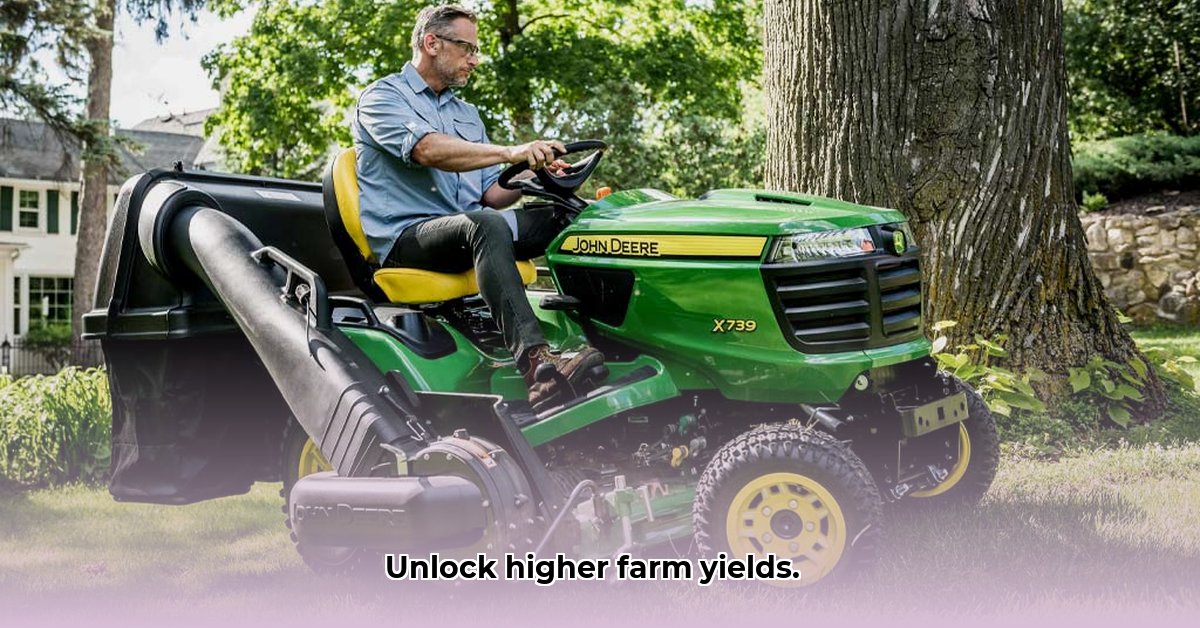
John Deere Garden Tractors in Sustainable Small-Scale Agriculture: A Comprehensive Analysis
Small-scale farmers face the constant challenge of balancing productivity with environmental sustainability. John Deere garden tractors represent a potential solution, offering increased efficiency and versatility. However, their environmental impact and long-term viability within sustainable farming systems require careful consideration. This detailed guide will analyze the advantages and disadvantages, provide actionable steps for farmers, and offer recommendations for both manufacturers and policymakers. For information on financing options, check out tractor financing.
Advantages of John Deere Garden Tractors for Sustainable Farming
John Deere garden tractors offer several benefits for small-scale sustainable agriculture:
Fuel Efficiency: Compared to larger tractors, these models exhibit significantly lower fuel consumption, translating to reduced operational costs and a smaller carbon footprint. How much lower? Further research is needed to quantify the exact savings, but anecdotal evidence from farmers suggests significant reductions.
Maneuverability: Their compact size and excellent maneuverability are particularly advantageous in small fields with limited access or obstacles. This precision minimizes crop damage and maximizes efficiency in tight spaces. Can you quantify the reduction in crop damage? More rigorous studies are needed to provide concrete figures.
Power and Versatility: Despite their size, these tractors possess considerable power, enabling them to perform a variety of tasks, including soil preparation, planting, harvesting, and material transport. This versatility reduces the need for multiple pieces of equipment. What specific tasks can they handle and at what volume? Specific model capabilities should be referenced for accuracy.
Disadvantages and Challenges of John Deere Garden Tractors
Despite their advantages, several challenges need to be addressed:
Initial Cost: The upfront investment can be substantial, posing a significant barrier for some small-scale farmers. Thorough cost-benefit analyses are crucial before purchasing. What are typical costs and associated financing options? We need data from different models and regions to provide representative cost figures.
Maintenance and Repair: Regular maintenance is essential, potentially including expensive parts and specialized labor. Access to reliable repair services can be a limiting factor, especially in remote areas. Are there data on average maintenance costs across different models and regions? This needs further investigation to provide informed advice to farmers.
Environmental Impact Data Gap: While fuel efficiency is a positive, comprehensive life-cycle assessment data, including manufacturing, operation, and disposal, is currently lacking. This hinders fully assessing the environmental impacts compared to alternative methods. What are the key missing data points hindering a complete assessment? Research needs to focus on manufacturing emissions, the disposal process, and the overall carbon footprint of these machines. What is the impact of lubricants and other materials on soil health? This requires further research to determine the long-term effects on soil ecosystems.
Sustainability Assessment of John Deere Garden Tractors
The sustainability of using John Deere garden tractors in small-scale agriculture hinges on several factors:
Organic Farming Compatibility: Further research is required to determine the full compatibility of these tractors with organic farming practices. Are any specific models certified for organic farming? We need clarification on the use of pesticides and fertilizers in conjunction with these tractors.
Soil Health Impact: The potential for soil compaction and erosion needs careful consideration. Reduced tillage practices and other soil-conservation measures are crucial to mitigate adverse impacts. What are the recommended reduced tillage practices for preserving soil health when using this type of equipment? Best management practices should be detailed to provide practical guidance to farmers.
Overall Environmental Footprint: A comprehensive life-cycle assessment, including manufacturing, operational emissions, and end-of-life disposal, is crucial for a complete evaluation of the sustainability of these tractors.
Actionable Steps for Farmers Considering John Deere Garden Tractors
Conduct Thorough Research: Compare various John Deere garden tractor models based on power, fuel efficiency, maneuverability, and maintenance requirements. Read independent reviews and consult with other farmers.
Perform a Cost-Benefit Analysis: Calculate the total cost of ownership, including purchase price, fuel, maintenance, repairs, and potential financing costs. Compare this to the potential increased productivity and cost savings.
Assess Local Repair Services: Ensure easy access to reliable repair services and readily available parts. Downtime can significantly impact productivity and profitability.
Integrate Sustainable Farming Practices: Adopt reduced-tillage farming, cover cropping, and other methods to minimize soil compaction and erosion. Consider using the tractor in conjunction with less environmentally disruptive farming practices.
Recommendations for Manufacturers and Policymakers
John Deere: Conduct and publish comprehensive life-cycle assessments of their garden tractors, providing transparent data on environmental impacts.
Policymakers: Implement incentive programs, such as subsidies or tax breaks, to support the adoption of more sustainable agricultural technologies, including fuel-efficient tractors. Invest in research to develop more environmentally friendly alternatives and improved data-collection methodologies.
Conclusion
John Deere garden tractors offer significant potential for enhancing productivity on small farms, but their long-term sustainability requires careful evaluation. The currently available data is insufficient to fully assess their environmental impact, and a comprehensive life-cycle study is urgently needed. By completing this crucial research and fostering collaboration between manufacturers, researchers, and policymakers, we can fully leverage the potential benefits of small tractors to improve both profitability and environmental sustainability in small-scale agriculture.